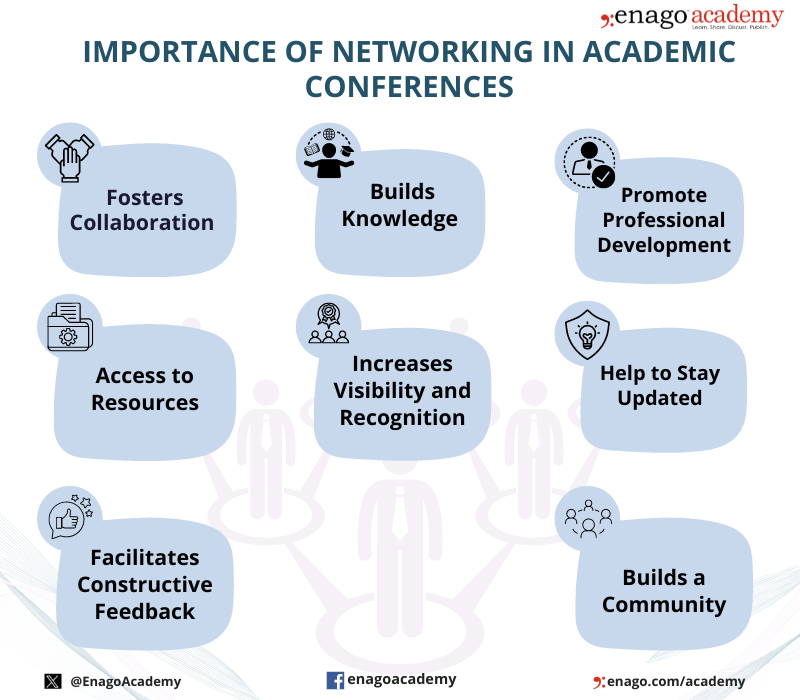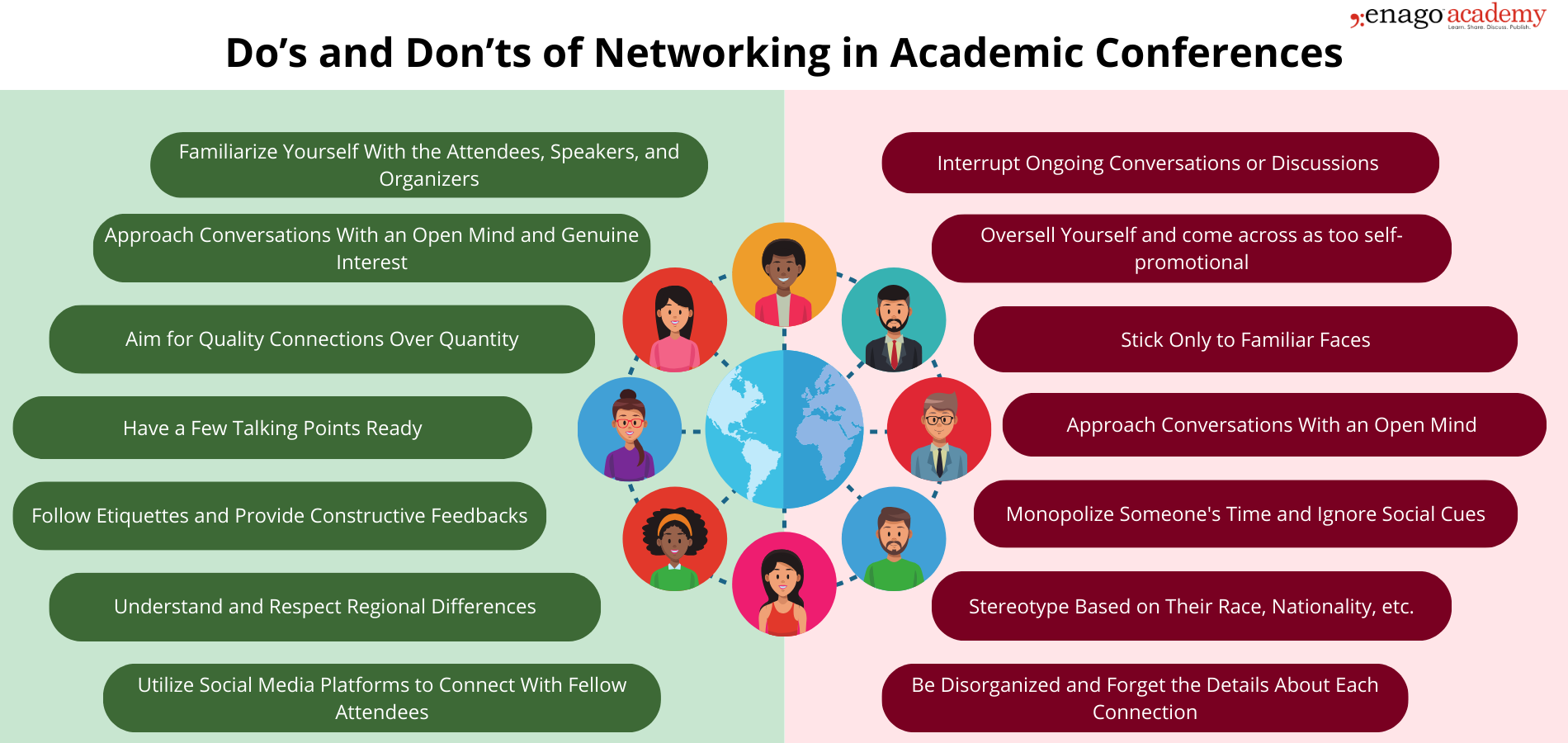Unlocking the Power of Networking in Academic Conferences

Embarking on your first academic conference experience? Fear not, we got you covered! Academic conferences stand as vibrant hubs for knowledge exchange where scholars, researchers, and academics converge to share their latest findings, engage in meaningful discussions, and foster collaborative endeavors. They serve as crucial networking opportunities which offers several benefits. However, proper preparation and networking can play a significant role in reaping the maximum advantages from these conferences.
Why Should You Attend Academic Conferences — Importance of academic conferences
Academic conferences, ranging from local symposiums to global events, serve as platforms for researchers to present findings and explore the latest developments in their fields. These events are overseen by scientific committees to ensure the quality of research presented. They serve as platforms for the dissemination of research findings, fostering intellectual dialogue, and nurturing professional relationships. Furthermore, they help in forming connections that may lead to future collaborations or funding opportunities. However, effective pre-conference preparation and active engagement during the event is necessary to maximize its value.
How to Prepare for an Academic Conference
One must undergo make a thorough preparation to make the most of an academic conference. Strategic planning is key to making the most of an academic conference. From familiarizing oneself with the conference schedule to actively engaging in discussions, one must leave no stone unturned in taking full advantage of the opportunities available. Here are some ways to prepare for an academic conference.
Before the Conference
1. Identify the Chances of Contributing to the Program:
Propose a session or workshop or align your work with the conference theme. Explore opportunities to facilitate discussions for gathering feedbacks that may shape the future course of your research.
2. Prepare and Practice Your Talk:
If your proposal is accepted, prepare your presentation well in advance. Seek feedback from colleagues to refine your talk and generate interest among co-workers.
3. Arrange Networking Meetings:
Identify relevant sessions in the conference program and reach out to other participants. Foster meaningful connections by building a good rapport that demonstrates appreciation for others’ work.
4. Update Out-of-Office Response:
Before departing, set up an out-of-office email response that includes information about the conference; thereby, allowing others to learn more about your work in your absence.
During the Conference
1. Arrive on Time:
Arriving early is crucial for both physical and virtual conferences. Familiarize yourself with the venue or virtual event software to avoid any issues.
2. Plan Your Day:
Review the conference agendas and plan your day accordingly. Attend sessions, including the ones outside your stream to gather insights that can impact your research.
3. Keep a Track:
Document what you’ve learned and the contacts you’ve made at the end of each conference day. Reconnect with notable connections, express gratitude for insights, and leave a lasting impression.
4. Attend Poster Sessions:
Don’t miss the poster sessions as they provide additional networking opportunities and insights into research projects. Plan in advance to avoid missing sessions on topics of interest.
Researchers can ensure a fruitful participation by following the above mentioned points. However, to gain a long-term benefit of such conferences, effective networking is necessary. Furthermore, building a strong network within the academic community contributes to the overall growth and advancement of individuals and the collective body of knowledge in a particular field.

The benefits of networking in academic conferences cannot be understated due to these reasons. Networking fosters professional development with established experts that can result in mentorship and career guidance.
7 Strategies for Effective Networking During Academic Conferences
Networking at academic conferences involves creating genuine touchpoints and nurturing connections over time, which can lead to unexpected opportunities. While challenging initially, consistent practice can make networking more natural. Following are some strategies to network during conferences to reap the benefits of a conference.
1. Introduce Yourself
Prepare concise and engaging introduction that highlights your name, affiliation, and research interests. This will make it easier to start conversations. Additionally, wear your identification badge to help others recognize you better.
2. Volunteer or Participate in Sessions
Volunteering for conference activities or participating in panels can offer more opportunities to connect with attendees. Additionally, participate in workshops and roundtable discussions to engage with smaller groups of people for more intimate setting for networking.
3. Engage and Ask Questions
Identify the common interests and initiate a conversation based on those. Interactive sessions provide excellent networking opportunities focused on common interests. Therefore, utilize them by preparing questions that spark interesting conversations.
4. Be Approachable
Smile, make eye contact and maintain an open body language. Be authentic in your interactions. Remember names and initiate conversations, instead of waiting others to approach.
5. Listen Actively
Focus on what others are saying during conversations and do not interrupt when others speak. This not only shows respect but also helps you respond thoughtfully. Conclude a conversation gracefully and provide direction for future interactions.
6. Attend Social Events
Participate in post-presentation social events to build connections and relationships beyond research discussions. These informal settings provide a relaxed environment for networking with like-minded individuals.
7. Use Networking Apps
Use social media to connect with fellow attendees before, during, and after the event. After the conference, follow up with the people you met. Send personalized emails expressing your pleasure at meeting them and your interest in future collaboration.
Remember that effective networking is not just about collecting business cards but building meaningful relationships. Approach people with a positive attitude, be open to learning from others, and be generous in sharing your own experiences and insights. Additionally, one must take utmost care to bridge cultural differences and avoid stereotyping in academic conferences. Recognizing and respecting diverse cultural backgrounds contributes to a more inclusive and productive academic environment with increased opportunities for cross-cultural collaboration.
Here are some do’s and don’ts of networking in conferences

Additionally, participants can engage in small talks to initiate a conversation which may grow to a meaningful collaboration. Establishing cordial connections through casual conversations can lay the foundation for impactful collaborations in the future. Engaging in small talk may seem inconsequential, but it can be a powerful tool for relationship-building. However, this can be a challenging task for introverts; as they generally prefer in-depth and meaningful discussions over small talks.
Networking Tips for Introverts
excel in individual work and deep thinking, the social and interactive nature of conferences can be overwhelming for them. The bustling crowds, which can be mentally and emotionally exhausting for introverts. Furthermore, engaging in casual conversations with strangers in a huge crowd can be a daunting task for them.
Are you an introvert who faces similar struggles? Here are some exclusive tips for you! Download Now!
Remember, networking is a skill that can be developed over time. Finding strategies that align with your personality can help make networking a more positive and enjoyable experience at academic conferences.
Academic conferences are not only platforms for knowledge exchange but also catalysts for professional growth. Whether attending, presenting, or organizing, active participation in these events contributes significantly to an individual’s academic journey. By navigating the conference landscape strategically, researchers can enhance their profiles, establish connections, and contribute meaningfully to their fields.
Frequently Asked Questions
Networking at conferences is an essential skill for academics and professionals alike. Here are some tips on how to network effectively at conferences:
1. Set Clear Goals
2. Prepare in Advance
3. Approach People Strategically
4. Actively Listen
5. Exchange Contact Information
6. Attend Workshops and Roundtables
7. Follow Up
Networking events provide excellent opportunities to connect with professionals, build relationships, and advance your career. Here are some tips on what to do at networking events:
1. Arrive Early
2. Have a Clear Objective
3. Prepare a Concise Introduction
4. Listen Actively
5. Exchange Business Cards
6. Initiate Conversations
Academic conferences help researchers to present findings and explore the latest developments in their fields. They serve as platforms for knowledge dissemination that fosters intellectual dialogue. Furthermore, they help in nurturing professional relationships and forming connections that may lead to future collaborations.
Different types of academic events include Conferences, Workshops, Seminars, Symposia, Webinars, Roundtable Discussions, Panels, etc.









![What is Academic Integrity and How to Uphold it [FREE CHECKLIST]](https://www.enago.com/academy/wp-content/uploads/2024/05/FeatureImages-59-210x136.png)